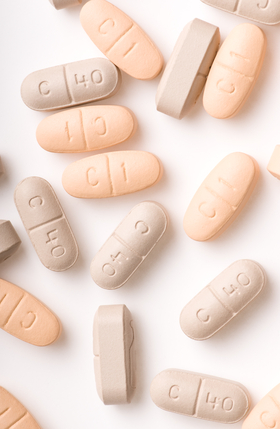Calcium. Lord knows that both men and women need calcium for bone health. However, women in particular start to lose bone density as early as age 35 and, within the first 10 years of the onset of menopause, up to 50% of spongy, or trabecular bone (the network that makes up most of bone structure) and up to 30% of cortical bone (the outer shell) are also lost.
Despite its importance to bone health, there is a lot of controversy surrounding calcium, particularly when it comes to the recommended dietary allowance or RDA. Currently, the Institute of Medicine recommends that women between the ages of 19 and 50 ingest at least 1,000 mg a day and those over 50, 1,200 mg a day. Still, too much of a good thing is too much; an overreliance on supplementation (often as a result to avoid milk, yogurt, cheese and other dairy products) may increase the risk for heart disease and kidney stones.
In a review in the journal Menopause, researchers note that women who rely on supplements for their daily calcium needs more often than not take doses that exceed the RDA. The reason that this is problematic is that our bodies cannot absorb more than 500 mg daily of calcium from either food or supplements in any two-hour period, so if you are eating calcium rich foods (which in addition to the aforementioned dairy also includes canned fish with bones, tofu, calcium-fortified products, broccoli, collards and kale), also adding a daily supplement may take you to a place that you want to avoid. Importantly, while higher dietary calcium from food actually appears to reduce kidney stone formation and may even offer protection from heart disease, the opposite is true for supplements:
- In the Women’s Health Initiative study, exceedingly high intake of calcium (from a combination of diet and supplements) was shown to increase the risk for kidney stones by 17%.
- While the link between calcium supplements and heart disease is still being teased out, findings from a large review concluded that they raised the risk for heart attack by as much as 30%.
What should you do?
- Obtain as much calcium as you can from your diet to meet recommended daily goals and only take supplements if this is impossible or if recommended by your health practitioners.
- Contrary to popular belief, the RDA goal for calcium can often be reached by taking only 500 mg daily of calcium via supplement.
- If you are going to rely on calcium supplements, form matters. Researchers believe that calcium citrate may be less likely to cause kidney stones than calcium carbonate. And as I wrote back in 2009, there may be an advantage to a form of calcium known as ossein-hydroxyapatite complex (OHC), which is the mineral component of bones and teeth (OHC goes by the brand name of MCHA or MCHC and is easily found on the web).







